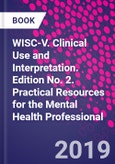WISC-V: Clinical Use and Interpretation, Second Edition provides practical information for clinicians on the selection of subtest measures, along with their proper administration and interpretation. Full Scale IQ is identified as important for predicting relevant behaviors and primary index scores for characterizing the child's strengths and weaknesses. Classroom indicators of low scores on each of these abilities are identified, with suggested interventions, accommodations and instructional strategies for low scorers. Coverage includes ethnic differences for the Full Scale IQ and each primary index score, along with evidence of the profound influence of parental attitudes and expectations.
Several other societal and contextual factors relevant to understanding racial/ethnic differences are presented. Two chapters review use of the WISC-V for identifying learning disabilities, testing of individuals with dyslexia, and best-practice recommendations to ensure accurate diagnosis and intervention. Concluding chapters describe advances in the Q-interactive system platform allowing administration of the WISC-V on iPads and other tablets, and how clinicians can tailor assessment using select WISC-V subtests and features.
Please Note: This is an On Demand product, delivery may take up to 11 working days after payment has been received.
Table of Contents
1. WISC-V: Advances in the Assessment of Intelligence 2. Practical Considerations in WISC-V Interpretation and Intervention 3. Advanced Interpretation of Executive Processes with WISC-V Integrated 4. Theoretical and Clinical Foundations of the WISC-V Index Scores 5. WISC-V Use in Societal Context 6. Testing Hispanics with WISC-V and WISC-V Spanish 7. Cross Cultural Issues in Children's Intelligence: An International Perspective 8. The Flynn Effect and its Clinical Implications 9. WISC-V and the Evolving Role of Intelligence Testing in the Assessment of Learning Disabilities 10. Translating Scientific Progress in Dyslexia into Twenty-first Century Diagnosis and Interventions 11. Issues Related to WISC-V Assessment of Cognitive Functioning in Special and Clinical Groups 12. Digital Assessment with Q-interactive 13. WISC-V and the Personalized Assessment Approach
Authors
Lawrence G. Weiss Vice President of Test Development for Pearson Clinical Assessment. Lawrence G. Weiss, PhD is Vice President of Test Development for Pearson Clinical Assessment. He oversees a department of 150 professionals and is responsible for all research and test development activities related to the company's psychological, educational, speech, language, and occupational therapy assessment products as well as post college admissions tests. He also advises on test development activities for the company's international business partners around the globe including Pearson Clinical Assessment offices in the United Kingdom, Australia, Canada, France, Germany, The Netherlands, India, China, Spain, and Brazil.Dr. Weiss has presented widely on intelligence in more than a dozen countries. He has authored or co-authored the following 7 graduate level text books:
. WISC-III Cross Cultural Analyses: Culture and Children's Intelligence (2003)
. WISC-IV Clinical Use and Interpretation (2005)
. WISC-IV Advanced Clinical Interpretation (2006)
. WISC-IV Clinical Use and Intervention (2008)
. WAIS-IV Clinical Use and Interpretation (2010)
. BAYLEY-III Clinical Use and Interpretation (2010)
. Advanced Clinical Assessment with WAIS-IV and WMS-IV (2013)
Some of his books have been translated into Spanish, Japanese, and Korean. In addition, he has authored or coauthored approximately 30 journal articles, 12 technical reports, and 10 other book chapters.
Dr. Weiss holds a PhD degree in industrial and organizational psychology from Texas A&M University, and a master's degree in clinical psychology from Trinity University. He lives in San Antonio, Texas, with his wife of 28 years, Judy Ann. The Weiss' have two adult sons. Donald H. Saklofske Professor, Department of Psychology at The University of Western Ontario, Visiting Professor at Beijing Normal University and International Research Associate, University of Florence. He is a Fellow of the Association for Psychological Science and the Canadian Psychological Association. Dr. Donald H. Saklofske is Professor, Department of Psychology at The University of Western Ontario, Visiting Professor at Beijing Normal University and International Research Associate, University of Florence. He is a Fellow of the Association for Psychological Science and the Canadian Psychological Association. Don's research focuses on personality, intelligence, individual differences and psychological assessment. He has published more than 300 journal articles, book chapters and books. He is Editor-in-Chief of Personality and Individual Differences and Journal of Psychoeducational Assessment. James A. Holdnack Research and Statistical Consultant, Bear, DE, USA. Aurelio Prifitera San Antonio, TX, USA.








